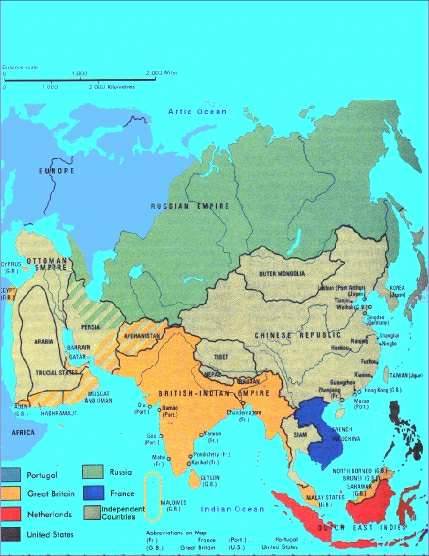6.3 Decolonization
The desire for adventure, the spread of religion and imperialism led to the geographical discoveries in the 15th and the 16th centuries. These geographical discoveries helped the process of colonization. Colonialism has been associated mostly with European nations. Great Britain, France, Holland, Portugal etc. were involved in this process. Colonialism refers to a system of government of one particular nation that exercises control over peoples of other nations weaker than the governing nation. The colonial nation dictates terms to the residents of the colonized areas. They exert control over every field of socio-cultural, political and economic activity. They also exploit the natural resources of the colonized lands.
In the latter half of the fifteenth century, European nations had already formed their colonies in the African, Asian, American and Australian continents. For over four-and-a-half centuries the colonies endured the regime of the colonizers. It was only in the twentieth century that the process of ’de-colonization’ started. The reasons for decolonization were in a way mainly economic. In the aftermath of the Second World War, the colonizing powers realized their incapacity to exert control over the colonies. Their coffers were drained by the War. Also the colonies had started agitating for freedom. Therefore Britain, France, Portugal, Spain, Germany etc. transferred power to the colonies. By the 1980s only a few colonies were still to be given their freedom. Hongkong is one such British colony that will be returned to its mother nation China in a few months’ time.
It was seen from long before that colonization was never happily accepted by any nation. The governments of colonial nations had always faced heavy opposition against the colonial policies. European colonies in Australia, New Zealand and Canada got Dominion status between the years 1800-1990. By this they controlled their own government and they remained part of the British Empire. New Zealand was given a responsible government in 1856 and in 1907 it was granted full dominion. Colonies of Australia were also granted responsible governments between the years 1853 to 1890. In 1910 a union of South African States was formed. South Africa became an independent republic.
Egypt got independence from the U.K. in 1922, and they withdrew in 1952. India won independence in 1947. The British also divided it on the basis of religion. Burma and Sri Lanka became independent in 1948.

Exhibit 6.2
Portions of the world colonized by European powers
In West Africa, Ghana got independence in 1957. Nigeria in 1960 and Sierra Leone in 1961 became free. Zimbabwe and Namibia also became independent in 1980 and 1990 respectively. Tunisia and Morocco became free when the French gave them independence in 1954. After the Second World War Portugal was the only European colonial power to resist the trend of decolonization. Only when government changed in Portugal, Mozambique, Angola and Guinea got independence in 1975.
6.3a Consequences of colonialism
Colonialism had both good and negative effects. The psychological consequences on the colonized were severe because whatever the colonial nation did in the colonies was first for their own benefit. Even the advantages brought to the people of their colonies were due to the requirements of the colonial government. Some of the advantages of colonial rule were the building of roads, railways, harbors and hospitals in the colonies. The colonizing powers introduced the modern education system and medicine. They even introduced modern agricultural methods.
Most often, the colonial government exploited the native people and their natural resources. Only a very small share of profit was given to them. The colonies were used as the source for the raw material and the markets for the finished foreign goods. This badly affected the native economy. The money which was generated by these colonial governments and also what their officers earned was invested in their own nations. As this money did not circulate in the colony it did not benefit the people of the colony. Even politically these nations made several changes. They arbitrarily partitioned the colonies in some cases, while at some places they made divisions on the basis of language, religion and custom.
There were also social and cultural effects. Various European languages with a rich tradition of literature were spread. The impact of western education and culture, their dress and language was acutely felt. Many people from the former colonies have also migrated to the countries who first ruled them. Thus it can be said that the colonial rule had a mixed blessing.
6.0 - Introduction
6.1 North Atlantic Treaty Organization
6.2 The Collapse of Communism in Russia
6.3 Decolonization
6.4 European Monetary Union
6.5 The Re-Unification of Germany
6.6 Points to Remember